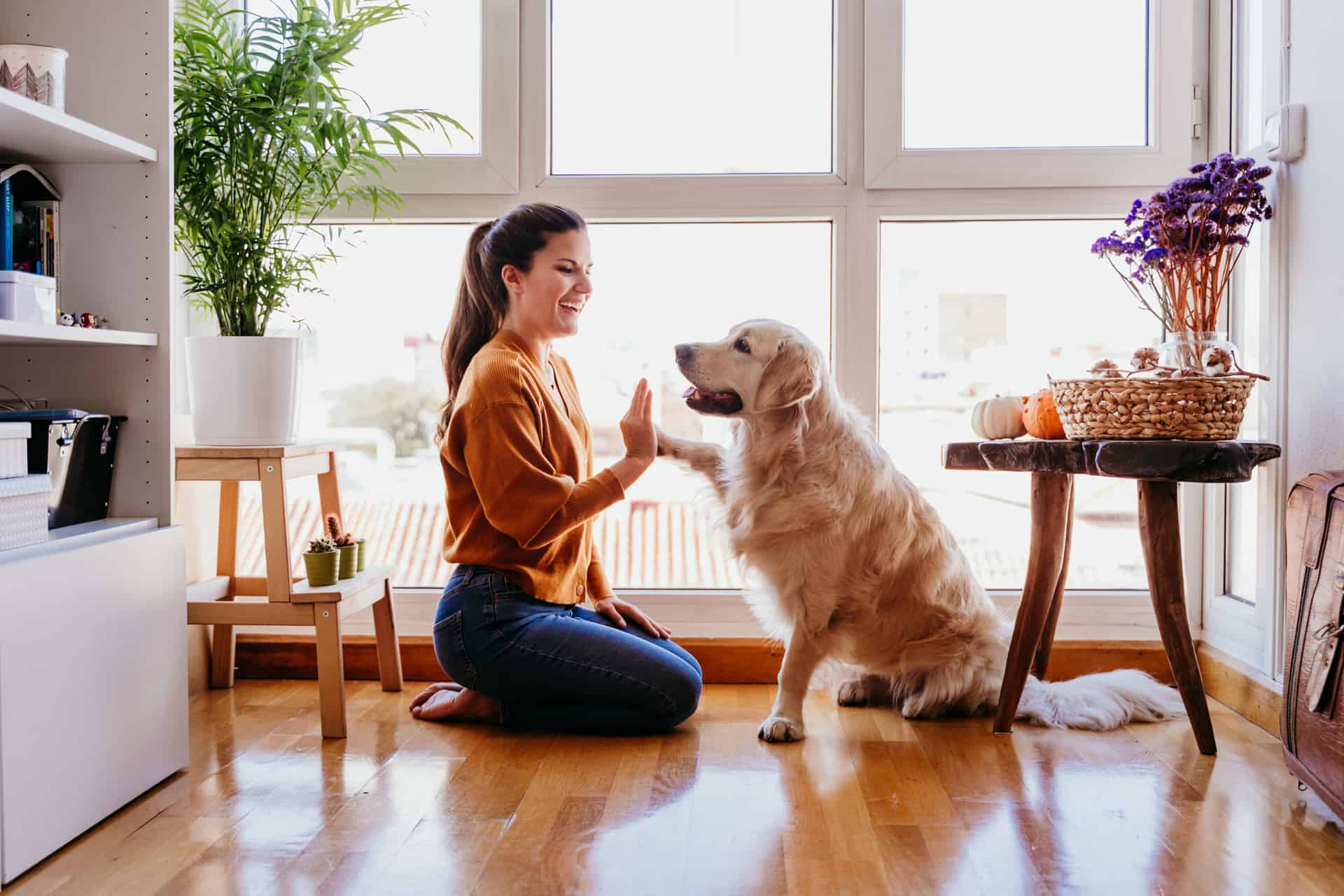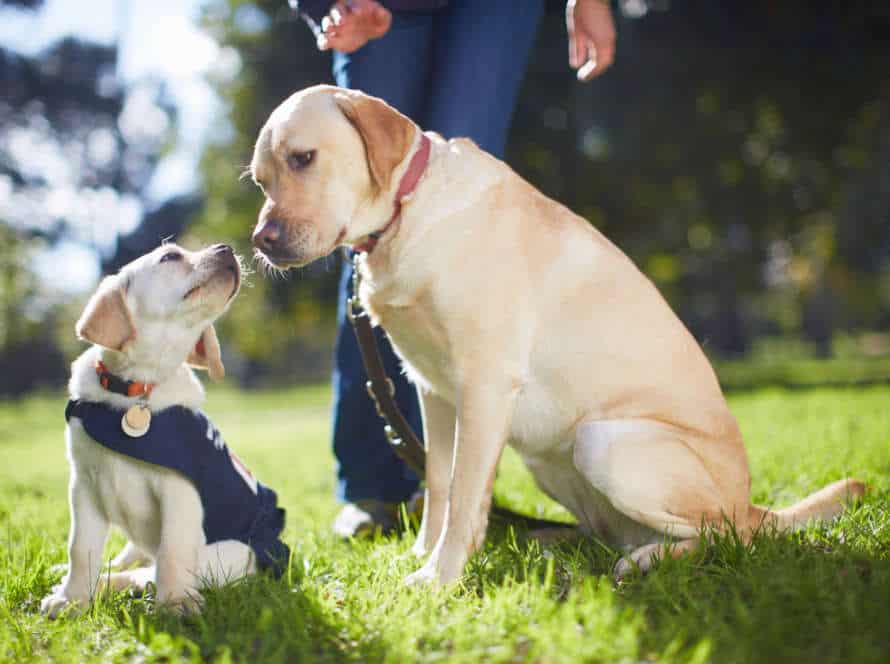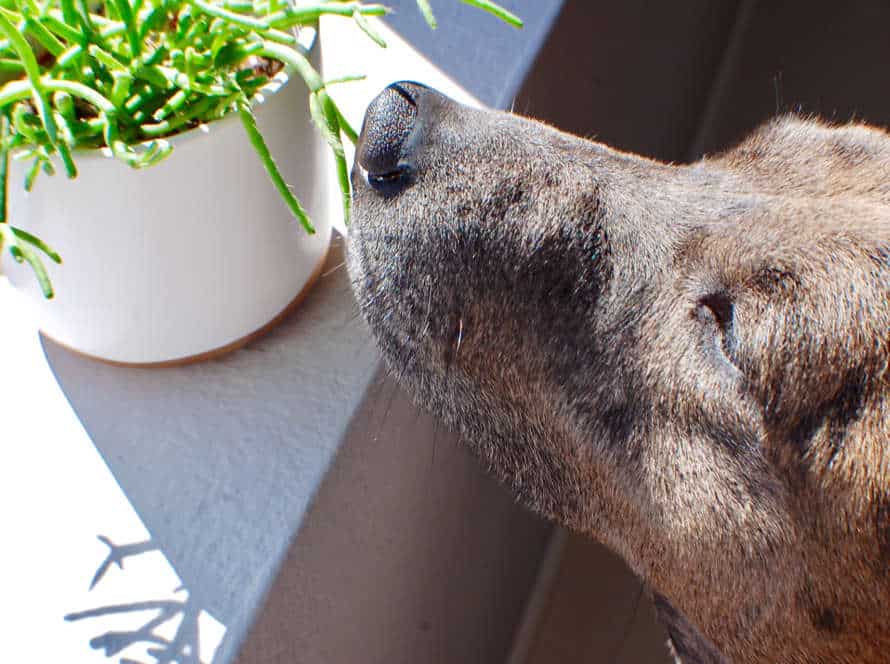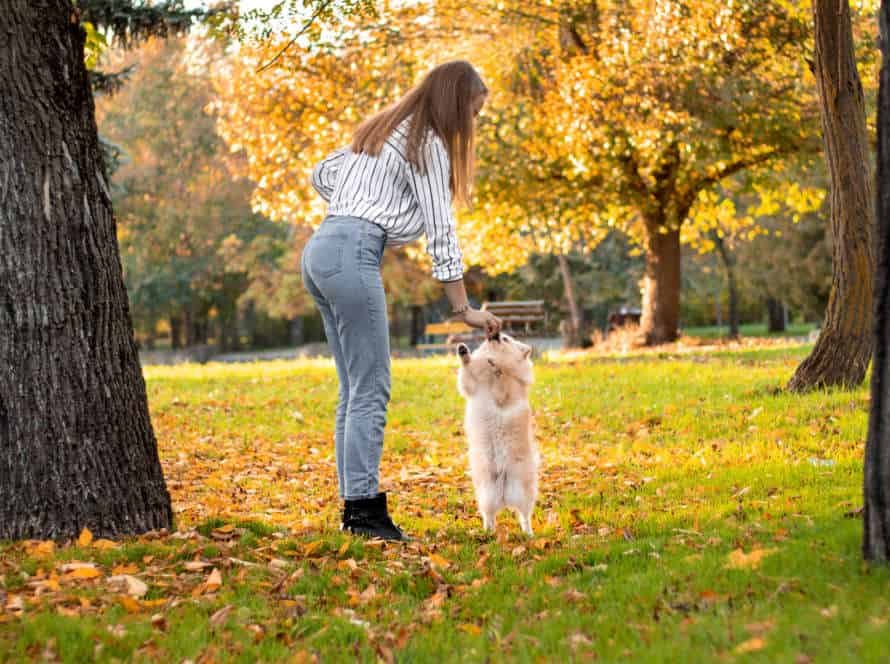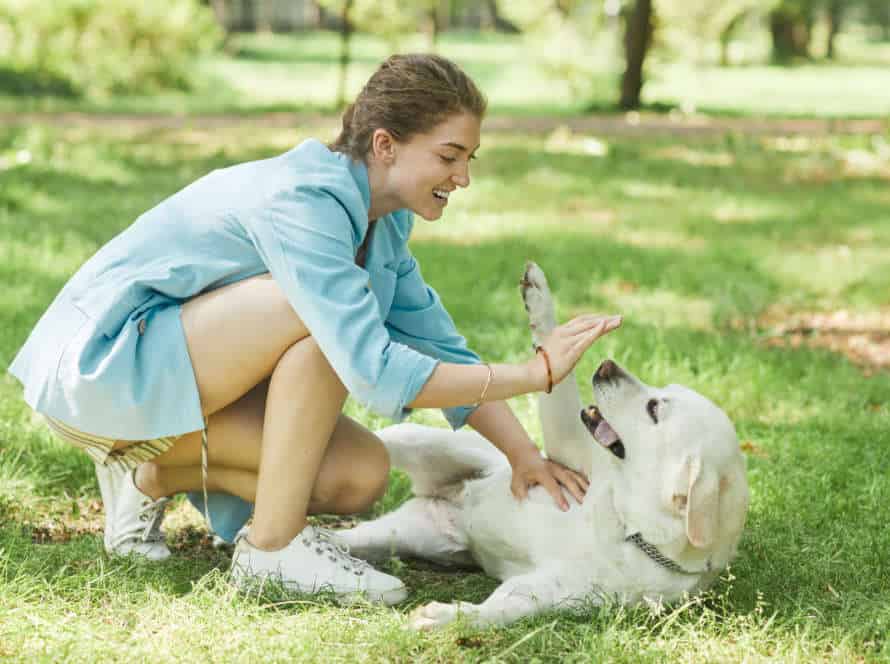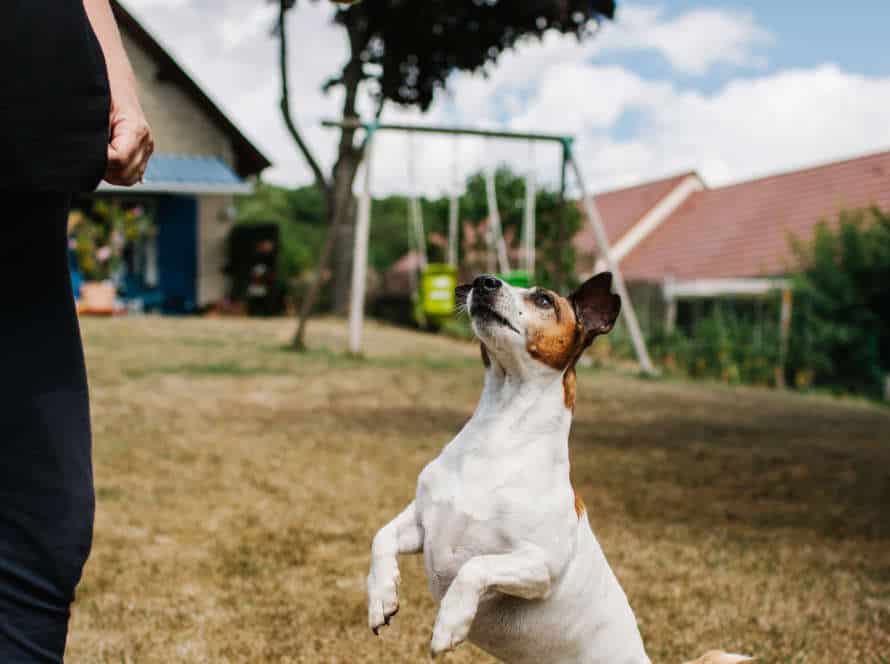Senior Dog Trick Training: Keep Their Minds Active
As dogs age, they may experience mental decline. Trick training can help slow this down and keep their minds active. Here are some tips for senior dog trick training:
- Keep it simple. Choose tricks like “spin” or “shake”.
- Use positive reinforcement. Treats, love and praise them for performing correctly.
- Adapt to their abilities. Modify tricks to suit physical limitations.
- Be patient. They may need more time.
By trick training, you can help them maintain mental abilities and enjoy their later years.
Why Senior Dogs Need Trick Training
Tricks can be a great help to senior dogs. They keep their minds active and slow down mental decline. Tricks also help build confidence, reduce stress and anxiety, and can stop annoying behaviors like compulsive licking and barking. Plus, tricks keep dogs physically active as they age.
So why do senior dogs need trick training? And how do you get started? Let’s find out!
Benefits of Trick Training for Senior Dogs
Trick training offers plenty of perks for elderly pooches. It stimulates their minds, gives them physical activity, and helps them better communicate with their owners.
As dogs get older, they may have problems with their cognitive abilities and physical strength, which can lead to declining health and poor quality of life. Trick training helps to keep their brains active, slowing down cognitive decline.
It also gives them physical exercise, a necessity for aging dogs who are more prone to joint pain and arthritis.
Plus, the bond between senior dogs and their owners grows stronger through trick training. Owners get to observe their furry friends’ happiness and liveliness as they learn new tricks and get positive reinforcement for good behavior.
Pro tip: Start with easy tricks and slowly increase the difficulty. Always use positive reinforcement to keep senior dogs motivated!
Signs That Your Senior Dog Needs Stimulating Activities
As dogs age, their physical and mental capabilities begin to decrease. It’s important to watch out for signs that your elderly pup needs stimulating activities to keep their minds healthy and alert. Here are some typical clues:
- Reduced mobility: A senior dog may become less active due to joint pain or other age-related issues.
- Less enthusiasm for play: Older dogs may not be as interested in playing with toys or taking part in physical activities.
- Memory loss: Older dogs may forget familiar people or places, and become confused.
- Sleeping more: Older dogs need more rest, but too much sleeping could mean boredom or a lack of mental stimulation.
By involving your senior dog in trick training, you can keep their minds active and improve their cognitive abilities. It’s a fun way to bond with your pet and keep them mentally fit!
Pro Tip: Reward-based training motivates good behavior and strengthens the connection between you and your senior dog.
How Trick Training Helps Senior Dogs Stay Mentally Active
As dogs get older, their brains may not work as well. Trick training is fun and helps keep senior dogs engaged. Here’s why:
- Mental Exercise: Trick training gives senior dogs some brain exercise and can help them stay sharp.
- Bonding: It’s a great way for the senior dog and their owner to bond.
- Physical Activity: Some tricks involve physical movements, so senior dogs can get low-impact exercise.
- Confidence Booster: Learning new tricks can make senior dogs feel good about themselves.
Tips:
- Start with easy tricks and build up.
- Reward progress with treats, praise or toys.
- Practice in a quiet place to avoid anxiety.
- Keep sessions short to prevent tiredness.
Pro Tip – Trick Training isn’t just for puppies! Senior dogs can get a lot out of it, and it’s never too late to teach them new tricks.
Types of Tricks to Teach Senior Dogs
It’s not only physical, but mental stimulation too! Keeping a dog’s mind active through trick training is a must for senior dogs. Teaching a range of tricks can make things more fun – from easy puppy tricks to tougher ones.
Here are some tricks you can teach your senior pup:
- Regressions of puppy commands
- Complex engagement tricks
- And more!
Simple Tricks for Senior Dogs
Teaching tricks to senior canines is a great way to keep their minds active and aid healthy aging. Here are some simple ones:
- Touch: Show your older dog to touch your palm with their nose. This supports their cognitive ability and sensory growth.
- Spin: Encourage your senior pooch to make a full circle using a treat as an incentive. This helps flexibility and balance.
- Shake: Train your aged pup to lift their paw and present it to you in a shaking motion. This encourages communication and strengthens the bond between you and your pup.
- Roll-over: Command your senior dog to lie down and tempt them into a prone position with a treat as a reward. This helps keep mobility and joint health.
Remember that senior dogs can have restrictions, so always check with a vet before starting a new training plan for your furry pal.
Intermediate Tricks for Senior Dogs
Training tricks for senior dogs is a great way to keep their minds busy and make their behavior better. Here are some tricks you could teach your senior pup:
- Balance and co-ordination: Tricks that involve balance and co-ordination, like standing on back legs or walking on a thin surface, help increase their core strength and stability.
- Hide and seek: Teaching your old dog to find a hidden object, treats, or toys can help sharpen their sense of smell.
- Basic obedience: Tricks like sit, stay, lie down, and come not only help with behavior but also provide mental stimulation and physical exercise.
- Puzzle games: Puzzle toys and games, like treat dispensers and interactive toys, give senior dogs a mentally stimulating activity.
Keep training sessions short and reward them with positive reinforcement. Pro tip: Training your senior tricks can also help build your bond and trust with them.
Advanced Tricks for Senior Dogs
Teaching tricks to older pooches? A great idea! But, pick the right ones for their age and abilities. Here are some tricks for mental stimulation:
- Obedience cues like “sit“, “stay” and “come“.
- Name recognition.
- Low-impact tricks such as “paw” and “roll over“.
- Scent games like “find it“.
- Puzzle toys and games requiring thought.
Remember: be patient and provide positive reinforcement. It’s key to keeping seniors physically and mentally active, which boosts their quality of life.
Methods for Teaching Senior Dogs Tricks
Teaching tricks to senior dogs can be a fun and rewarding experience. It’s stimulating for their minds, as well as for their bodies. Here are a few tips to help you teach your senior pup something new. Give it a go! It’s sure to be a blast!
Positive Reinforcement Training
Positive reinforcement training is a great way to teach senior dogs new tricks and keep their minds active. Reward-based teaching uses treats, praises, and love to motivate pups. Here are tips:
- Start simple, like “sit” or “stay,” before more complex ones.
- Pick treats that are easy to chew and digest. Especially if your pup has dental issues.
- Have patience. Older dogs may not hear or see as well. It may take longer.
- Keep fun and short. Always end on a positive note.
This type of training helps your senior pup stay engaged and builds the bond between you and your furry pal.
Pro tip: Check with your vet to make sure your pup is healthy enough for physical activity and teaching.
Clicker Training for Senior Dogs
Clicker training can be a great way to help senior dogs learn tricks and behaviors. Here are a few tips to make it successful:
- Short, positive sessions. Senior dogs may tire easily, so keep it short!
- Choose low-impact tricks that your senior pup can handle. Shaking hands or rolling over? Perfect!
- Use yummy treats as rewards – break them into smaller pieces for easy chewing.
- Be patient and encouraging – older dogs may take longer, but they can learn with love and positivity.
By using these methods, you’ll help keep your senior pup’s brain sharp and strengthen your bond.
Tips for Effective Trick Training for Senior Dogs
Tricks are great for senior doggos! They keep them mentally stimulated. But, teaching tricks to older dogs takes a different approach. Here are some tips to make it effective:
- Keep it simple. Start with one trick, and avoid the complex or hard ones.
- Use positive reinforcement. Praise them, give treats, show love for good behaviour and progress.
- Use hand signals. If your pup has hearing or sight issues, hand signals are better than verbal cues.
- Exercise caution. Be aware of your doggo’s physical limitations and health. Talk to your vet first.
- Be patient. Older doggos learn a bit slower – be patient and take your time.
These tips will help you bond with your pup, while keeping their mind active and engaged!
Challenges and Solutions for Senior Dog Trick Training
Training a senior doggo can be tricky, but very rewarding! It needs patience, consistency and understanding of how their aging affects them. As they get older, their agility, speed and reactions can slow down – making it harder to get the same results from training. Let’s explore the challenges and solutions when it comes to teaching tricks to senior dogs!
Common Challenges Faced When Training Senior Dogs
Training senior dogs can be tough. Age-related physical and cognitive issues make it harder. Common challenges are:
- Reduced mobility and flexibility
- Lower energy
- Vision and hearing loss
- Short-term memory loss
To beat these issues:
- Keep cues and hand signals easy to understand.
- Break training into shorter, more frequent sessions.
- Use positive reinforcement like praise, treats, or toys.
- Use bright toys and treats if vision is bad.
- Speak loud and clear for hearing loss.
- Incorporate scent and food-based games for minds.
With patience, consistency, and understanding, senior dogs can still learn new tricks! They can enjoy mental stimulation of training even in their golden years.
Solutions for Overcoming Training Challenges
Training a senior pup has its own set of difficulties, specifically when teaching them something new. Here are some usual issues and solutions to keep your older dog’s brain active during trick instruction.
Challenge: Physical Constraints. Senior dogs may fight with doing certain tricks due to their physical boundaries.
Solution: Go for less physically demanding tricks such as paw targeting, scent work, and hide-and-seek. Utilize softer training treats or shape the stunts in little advances.
Challenge: Memory Issues. Seniors may take more to learn and may even fail to remember tricks they already know.
Solution: Keep training sessions short and steady. Utilize basic and recurrent verbal prompts and hand signals. Check already learned stunts frequently to keep them new in your dog’s memory.
Challenge: Health Problems. Certain ailments in seniors like joint inflammation can make them unwilling or unable to do stunts like bouncing or rolling over.
Solution: Select tricks that are simple and agreeable for your senior pup to do. Utilize physical aids like a slope or a balance plate to help with equilibrium and portability.
Pro-tip: Be patient and offer your senior pup heaps of adoration and support during training sessions. With the correct stunts and methodology, your senior dog can in any case be a stunt big name!
How to Adapt Training Methods for Senior Dogs With Physical Limitations
As dogs age, they may have physical restrictions. Here are some of the issues and solutions for training elderly dogs with physical constraints.
Challenge: Arthritis or joint pain.
Solution: Pick low-impact tricks that don’t put pressure on their joints. Examples are playing dead, giving paw or teaching them new orders to help them stretch their joints.
Challenge: Hearing or vision loss.
Solution: Use hand signals when you train them, and pick tricks that are more visual than vocal commands.
Challenge: Decreased mobility.
Solution: Focus on tricks that can be done while sitting or lying down. Examples are rolling over or high-5.
It’s crucial to keep senior dogs mentally active to stop boredom and depression. Adapting to their physical problems will help keep their minds active and give them the focus and attention they need.
Fun Activities to Incorporate With Trick Training
Tricks are a superb way to keep your older pup’s brain active as they age. Plus, they’re a blast! To make trick training for your senior dog more enjoyable for both of you, mix in some fun activities. Here’s a peek at some activities you can do with your senior pup’s trick training. Enjoy!
Games to Play Along with Trick Training
Games are an amusing way to train and be with your elderly pup. Keep their minds active with these 3 fun activities:
- Hide-and-Seek: Hide treats or favorite toys and let them find it. Up the challenge by hiding the object in harder-to-find places.
- Puzzle Toys: Get toys with hidden treats. These toys will keep your pup busy and mentally stimulated.
- Agility Courses: Set up an obstacle course in your space and help them go through it. Agility courses help your dog stay fit and sharp.
Pro Tip: Incorporate games into trick training for more enjoyable sessions. This will motivate your pup to learn new tricks.
Outdoor Activities for Mental Stimulation
Outdoor activities are a great way to give dogs mental stimulation and help their physical health. Senior dogs can join in on fun activities and trick training for lots of mental activity. Just be patient, as each pup learns at their own speed.
Here’s how you can use trick training with outdoor activities to keep your senior pup’s mind busy:
- Agility course: Make a simple course with jumps and tunnels in your backyard. Guide the pup through it.
- Hide-and-seek: Hide treats or toys around the yard. Urge the pup to use their sense of smell to find them.
- Frisbee/Fetch games: Throwing and catching the Frisbee, or playing fetch with a ball, is great for physical exercise and mental stimulation.
These activities and trick training help with mental stimulation, and overall wellbeing for the dog.
Engaging Senior Dogs With Food Puzzle Toys
Senior pooches need to be active mentally and physically. Food puzzle toys are a great way to engage them. They give mental stimulation, and a challenge that keeps their minds sharp. Here’s how to use them:
- Choose a toy that’s the right size and difficulty for your dog’s age and skills.
- Start off easy, then increase the difficulty as they get better.
- Use treats or kibble instead of meals for a more rewarding puzzle.
- Mix food puzzle toys with trick training and other activities to keep their mind alert. This prevents anxiety and boredom-related issues.
Pro Tip: Watch your senior pup when playing with food puzzle toys, so they don’t swallow small parts or choke on the toy.
Frequently Asked Questions
1. Why is trick training important for senior dogs?
Trick training is important for senior dogs to keep their minds active and engaged, which can help reduce cognitive decline and ensure their overall physical and mental wellbeing.
2. How can I start teaching my senior dog new tricks?
You can start by identifying tricks that are appropriate for your senior dog’s age and physical condition, and breaking them down into easy-to-follow steps. Using treats and positive reinforcement can also be helpful in teaching your dog to perform new tricks.
3. What are some good tricks for senior dogs?
Tricks that are low-impact and gentle on your senior dog, such as high-five, shake, or twist, can be good options. You can also teach your senior dog to perform obedience skills or scent games.
4. Can trick training help with my senior dog’s mobility and joint health?
Yes, trick training can help improve your senior dog’s mobility and joint health by keeping them active and engaged in low-impact movements. It can also improve their overall flexibility and balance.
5. How much time should I dedicate to senior dog trick training?
You should dedicate at least 10-15 minutes per day to senior dog trick training. This can be broken down into short training sessions throughout the day to help keep your dog engaged and interested.
6. What else can I do to keep my senior dog’s mind active?
In addition to trick training, you can also provide your senior dog with puzzle toys, scent games, and daily interactive playtime to keep their minds stimulated and active.

